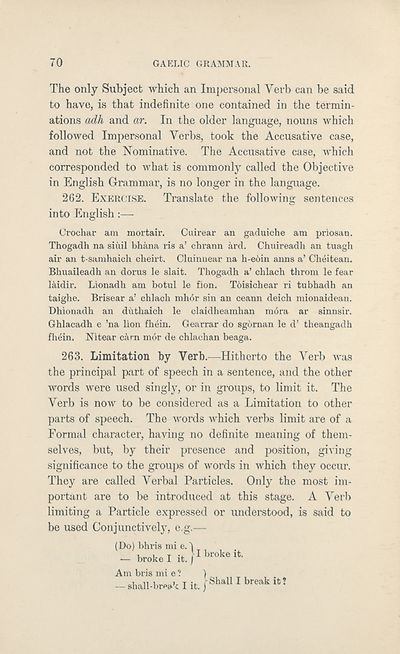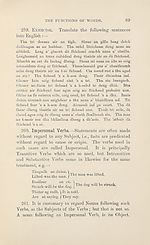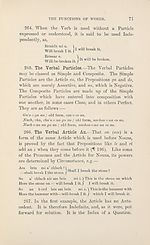Download files
Complete book:
Individual page:
Thumbnail gallery: Grid view | List view

70
GAELIC GRAMMAR.
The only Subject which an Impersonal Verb can be said
to have, is that indefinite one contained in the termin¬
ations adh and ar. In the older language, nouns which
followed Impersonal Verbs, took the Accusative case,
and not the Nominative. The Accusative case, which
corresponded to what is commonly called the Objective
in English Grammar, is no longer in the language.
262. Exercise. Translate the following sentences
into English:—
Crochar am mortair. Cuirear an gaduiche am priosan.
Thogadh na siiiil bhana ris a’ chrann ard. Chuireadh an tuagh
air an t-samhaich cheirt. Cluinnear na h-ebin anns a’ Cheitean.
Bhuaileadh an dorus le slait. Thogadh a’ chlach throm le fear
l&idir. Lionadh am botul le fion. Tbisichear ri tubhadh an
taighe. Brisear a’ chlach mhbr sin an ceann deich mionaidean.
Dhionadh an diithaich le claidheamhan mbra ar sinnsir.
Ghlacadh e ’na lion fhein. Gearrar do sgbrnan le d’ theangadh
fhein. Nitear earn mbr de chlachan beaga.
263. Limitation by Verb.—Hitherto the Verb was
the principal part of speech in a sentence, and the other
words were used singly, or in groups, to limit it. The
Verb is now to be considered as a Limitation to other
parts of speech. The words which verbs limit are of a
Formal character, having no definite meaning of them¬
selves, but, by their presence and position, giving
significance to the groups of words in which they occur.
They are called Verbal Particles. Only the most im¬
portant are to be introduced at this stage. A Verb
limiting a Particle expressed or understood, is said to
be used Conjunctively, e g.—
(Do)bhrismie.)
- broke I it. I1 broke lt-
Am bris mi e ? )
GAELIC GRAMMAR.
The only Subject which an Impersonal Verb can be said
to have, is that indefinite one contained in the termin¬
ations adh and ar. In the older language, nouns which
followed Impersonal Verbs, took the Accusative case,
and not the Nominative. The Accusative case, which
corresponded to what is commonly called the Objective
in English Grammar, is no longer in the language.
262. Exercise. Translate the following sentences
into English:—
Crochar am mortair. Cuirear an gaduiche am priosan.
Thogadh na siiiil bhana ris a’ chrann ard. Chuireadh an tuagh
air an t-samhaich cheirt. Cluinnear na h-ebin anns a’ Cheitean.
Bhuaileadh an dorus le slait. Thogadh a’ chlach throm le fear
l&idir. Lionadh am botul le fion. Tbisichear ri tubhadh an
taighe. Brisear a’ chlach mhbr sin an ceann deich mionaidean.
Dhionadh an diithaich le claidheamhan mbra ar sinnsir.
Ghlacadh e ’na lion fhein. Gearrar do sgbrnan le d’ theangadh
fhein. Nitear earn mbr de chlachan beaga.
263. Limitation by Verb.—Hitherto the Verb was
the principal part of speech in a sentence, and the other
words were used singly, or in groups, to limit it. The
Verb is now to be considered as a Limitation to other
parts of speech. The words which verbs limit are of a
Formal character, having no definite meaning of them¬
selves, but, by their presence and position, giving
significance to the groups of words in which they occur.
They are called Verbal Particles. Only the most im¬
portant are to be introduced at this stage. A Verb
limiting a Particle expressed or understood, is said to
be used Conjunctively, e g.—
(Do)bhrismie.)
- broke I it. I1 broke lt-
Am bris mi e ? )
Set display mode to:
![]() Universal Viewer |
Universal Viewer | ![]() Mirador |
Large image | Transcription
Mirador |
Large image | Transcription
| An Comunn Gàidhealach > An Comunn Gàidhealach Publications > Scottish Gaelic as a specific subject > (74) |
|---|
| Permanent URL | https://digital.nls.uk/125955905 |
|---|
| Description | This contains items published by An Comunn, which are not specifically Mòd-related. It includes journals, annual reports and corporate documents, policy statements, educational resources and published plays and literature. It is arranged alphabetically by title. |
|---|
| Description | A collection of over 400 items published by An Comunn Gàidhealach, the organisation which promotes Gaelic language and culture and organises the Royal National Mòd. Dating from 1891 up to the present day, the collection includes journals and newspapers, annual reports, educational materials, national Mòd programmes, published Mòd literature and music. |
|---|---|
| Additional NLS resources: |
|

